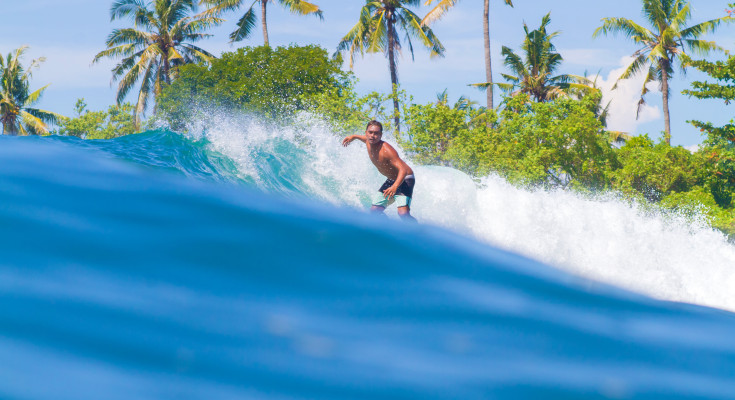|
A couple of inspiring stories about inter-ethnic relations in Indonesia…For several of their teenage years, Rizal Tanjung and Made Switra were best friends who went everywhere and did everything together, and also surfed together every day. The pair seemed oddly matched. Born of mixed Chinese and Batak descent in Ujung Pandang, South Sulawesi, Rizal had arrived in Kuta with his family when he was just three months old. Switra, on the other hand, was a Kuta kid whose father, grandfather and great-grandfather had made their livings fishing in the waters off Kuta Beach, and whose many brothers and cousins spent their childhoods on the beach and in the sea. Not just ethnicity but age and physique distinguished the two from each other, with Rizal the younger by three years and, funnily enough, by far the taller and skinnier. And then there was their skill at surfing… From the age of ten, Switra had received surfing lessons from Ketut Menda, the well-known Kuta surfer and owner of Bali Barrel, one of Bali’s first surf shops. Widely traveled and competitively successful, Menda had a heightened sense of responsibility towards younger surfers, and he happily offered them surfing lessons and lent them boards in exchange for assistance in his shop. For almost a decade, from 1983 to the early 1990s, Bali Barrel served as something like a headquarters for the young surfers of Kuta. The Bali Barrel boys’ daily routine was to surf early in the morning, go to school, surf again in the afternoon and then go to the shop to fix boards, handle sales, clean up and hang out with their friends and mentor. On weekends they slept in the shop, and Menda would take them on Sunday trips to relatively distant surf spots like Canggu and Uluwatu. The encouragement, coaching and sense of community the boys received in Bali Barrel were extremely conducive to the rapid improvement of their surfing. As time went by, some of them became good enough to attract the attention of Australian and Japanese surfers and business owners who offered them sponsorship in the form of clothing, boards, accessories, money and tickets overseas. Switra was already a competent-and sponsored-surfer by the time he first saw Rizal in the water at Kuta Beach in the mid-1980s. Switra still laughs at his memory of that day. ‘When he surfed, Rizal looked like a bird,’ Switra recalls, ‘with his feet close together and his arms stretched out to each side. And he was tall and skinny, so when he surfed you could clearly see how long and thin his legs were. I cracked up when I first saw him!’ But what impressed Switra even more than Rizal’s strange style were his enthusiasm and courage. While most of the other kids his age were still catching waves close to shore, Rizal was already going out the back on his own. ‘I was extremely surprised,’ Switra relates, ‘because at first I thought he was Javanese. I could tell he wasn’t Balinese, and it occurred to me to tell my younger brothers, ‘Hey, how come this Javanese kid is better than you?’ It was because he had a bigger spirit and a bigger love of surfing.’ One afternoon, not long after Switra first saw him in the surf, the ‘Javanese’ kid showed up at Bali Barrel. Recognising him, Switra called out, ‘Hey, you’re that kid who surfs like a bird!’ Motivated perhaps as much by his sense of the comic as by his admiration for the younger boy’s courage and enthusiasm in the surf, he offered to take Rizal under his own wing. ‘So, you want to become a surfer, do you? Well, you’ll have to follow me everywhere!’ Of course, Rizal courageously and enthusiastically accepted the offer. But Switra didn’t make it easy for him. ‘I gave him a very hard time,’ Switra says. ‘I got him to do all the hardest jobs in the shop and worked him really hard in the surf.’ Besides the pressure from Switra, Rizal also found himself subject to taunts from the other Bali Barrel boys on account of his Chinese appearance. Nonetheless, he gained a sort of acceptance into their community, and he was happy. Over the years that followed, Rizal’s overwhelming passion for and commitment to surfing guided him through an extraordinary career. Now, at the age of twenty-five, having achieved countless victories in competition around the world, acquired an international reputation as a great surfer and made enough money to buy his own car and house, Rizal can smile and observe, ‘Everything’s gone my way.’ |
Home Travel It’s Tough Being a Chinese (or Javanese or Sundanese or Minangkabau etc.) Surfer in Bali













